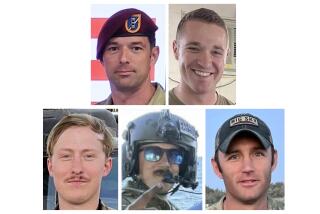Service Members Didn’t See Danger
- Share via
MIAMI — Despite a long history of bloody terrorism in the Middle East and a car bombing in Riyadh less than a year ago that claimed five American lives, many U.S. service members who rotate in and out of Saudi Arabia on assignments consider the duty more routine than hazardous.
Or they did until Tuesday.
“We had never even discussed the dangers there,” said Valerie Bright, whose husband, Air Force mechanic Steven Bright, is in his third tour of duty in Dhahran. “Usually he just says it’s boring.”
Indeed, although Muslim extremists had threatened retaliation for the execution last month of four Saudis who confessed to the November car bombing, life for most Americans in Saudi Arabia--about 5,000 military personnel and 35,000 civilians--seemed no more dangerous than life in the United States.
“It was a very boring location,” said Ted Fennig, father of Air Force Sgt. Patrick P. Fennig, 34, of Greendale, Wis., one of 19 Americans killed Tuesday when a powerful truck bomb exploded outside Khobar Towers on King Abdulaziz Air Base near Dhahran.
Of his son, a mechanic due home this week, Fennig said: “He was resigned to the fact that that was his assignment, and he put up with it, that’s all.”
In Clovis, Calif., the mother of Capt. Leland “Tim” Haun, 33, another bombing victim, said her son described his duty as “hot and actually sort of boring.” “And I said: ‘That’s good. Boring’s good,’ ” his mother said. “That means nothing’s happening.’ ”
But although Saudi Arabia seemed a boring assignment, something was happening. Despite Saudi Arabia’s reputation for stability, it sits in one of the most explosive areas of the world. And while the radical Islamic movement is more often associated with Algeria and Iran, it has also made inroads into the Saudi kingdom.
Since the end of the Persian Gulf War in 1991, the Air Force has deployed thousands of military personnel to Dhahran for 90- to 120-day tours of duty with the 4404th Composite Air Wing as part of “Operation Southern Watch.” The wing is charged with enforcing the “no fly” zone over southern Iraq that was established after the war.
Among the largest contingents assigned to the base were the 270 men and women of the 33rd Fighter Wing, which was completing its six-month annual deployment and was scheduled to rotate back to Florida starting today. At least four members of the 33rd were killed, including Master Sgt. Kendall K.J. Kitson of Yukon, Okla.
“He was fixin’ to be home this weekend,” said Kitson’s brother-in-law, Donney Robinson, 40. “He was doing a job for his country.”
Although Pentagon officials said that security around the Dhahran compound had increased recently after threats were made and suspicious cars were seen in the area, veterans of duty in Saudi Arabia said that fears of attack were low.
“Saudi Arabia is one of the most civilized, law-abiding countries in the world,” said Air Force Reserve Maj. Bobby D’Angelo, who served there after the Gulf War. “People are wary. . . . But there is no hostility in the air.”
Special correspondent Clary reported from Miami and Times staff writer Greenberg reported from Washington.
More to Read
Sign up for Essential California
The most important California stories and recommendations in your inbox every morning.
You may occasionally receive promotional content from the Los Angeles Times.













